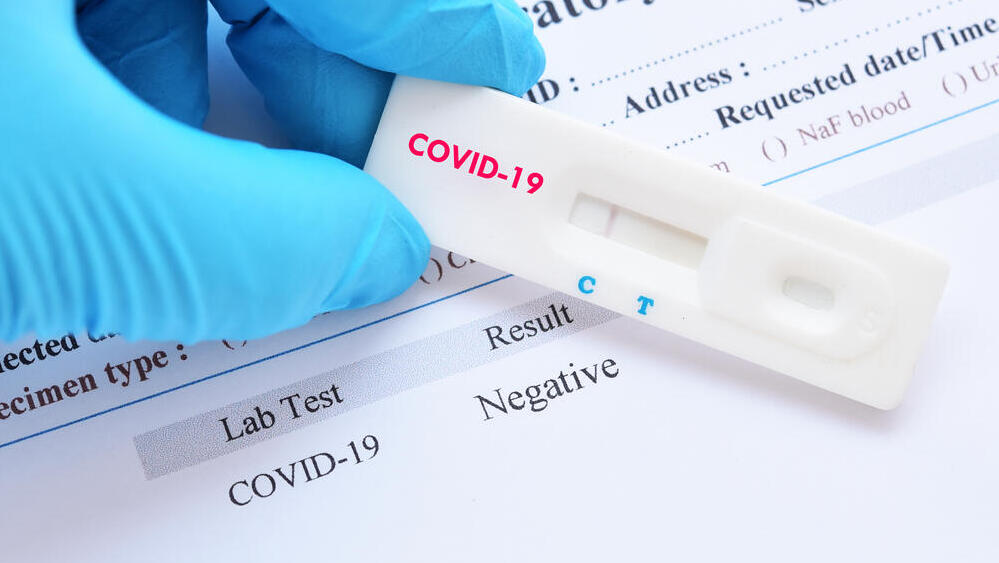Getting your Trinity Audio player ready...
EG.5, the new coronavirus variant that is known as Eris, is spreading worldwide. The World Health Organization announced Wednesday that it is monitoring the trends, but at this stage it does not pose a higher risk than other strains.
Read more:
So far, the coronavirus has caused the deaths of 6.9 million people globally, with over 768 million reported cases of infection since the start of the pandemic. In May, WHO declared that the COVID-19 pandemic is no longer a global emergency.
The new variant already accounts for 17% of infection cases in the United States, and it is presumed to be much higher. This is because global testing rates have dropped significantly, and many infected individuals either do not bother to undergo testing or are conducting home tests without reporting the findings. The variant has been detected in China, South Korea, Japan, the UK, Thailand, Canada and other countries as well.
What is the EG.5 variant?
The EG.5 variant is a mutation of the Omicron strain, which remains the most prevalent strain of the coronavirus worldwide. The EG.5 variant is slightly more dominant among the Omicron family in the United States. Social media users began referring to the new variant as "Eris" in accordance with Greek alphabet terminology, but this name is not officially recognized by WHO.
Another highly active variant is XBB.1.16, also from the Omicron family, sometimes referred to as "Arcturus."
How different is this variant from others?
Virologists have determined that the virus is slightly more evasive than its Omicron family counterparts, as it manages to evade the immune system and neutralize antibodies slightly better. These neutralizing antibodies are part of the immune system responsible for the initial defense against the invading virus. According to current knowledge, EG.5 spreads slightly faster than other variants but not significantly.
2 View gallery


The new Eris variant of COVID-19 already accounts for 17% of infection cases in the United States
(Photo: Shutterstock)
What are the symptoms of EG.5 infection?
The symptoms of this variant generally remain similar to those caused by other strains. They include runny nose, congestion, dry cough, fever, chills, shortness of breath, fatigue, muscle aches, loss of smell or taste, and headaches. There is no evidence to suggest that this new variant causes a more severe illness than previous variants.
Does the existing vaccine protect against the variant?
According to data from the Centers for Disease Control and Prevention, vaccines are expected to prevent severe illness similarly to other variants. However, it's important to note that individuals who have not received updated vaccinations against the new variants, or those who have not received booster shots on time, are not protected against various strains, including EG.5.
Why does the coronavirus continue to create mutations?
Viruses don't have their own life; they lack consciousness or "hidden intentions." New variants emerge due to errors during replication that result in genetic mutations. Some mutations don't provide the virus with any advantage, while others make it much more transmissible, allowing those variants to survive.
What should you do if you experience COVID-19 symptoms?
If you experience one or more of the typical COVID-19 symptoms, especially those associated with the "Eris" and "Arcturus" infections, such as excessive runny nose, dry cough, and flu-like symptoms, global health organizations recommend the following:
- Take a home COVID-19 test.
- Stay home and distance yourself from others.
- Ensure good ventilation in your living space.
- Wear a protective mask if you come into contact with others.
- Consider getting COVID-19 and booster vaccines if you haven't already.
- Inform your health care provider if your home test is positive.
- Maintain hygiene practices, including handwashing and disinfecting surfaces.
- In case of persistent high fever for more than three days, frequent vomiting, severe shortness of breath preventing complete sentences or simple tasks, extreme weakness, not urinating for more than 10 hours – seek medical help immediately.



